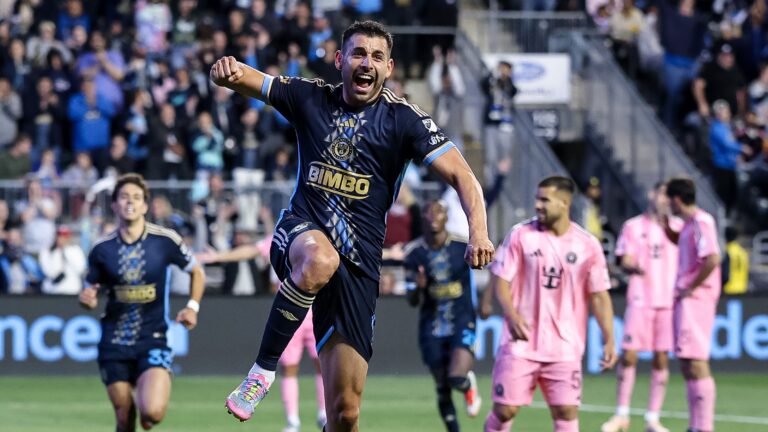Football General Manager
Brett Johnson rejects the premise that he is “building a soccer empire.”
A New England fan blog wrote those words about him last year, after Johnson – co-owner of Rhode Island FC, who also has a significant stake in Ipswich Town – announced that his USL Championship club would soon have a brand new stadium.
The New York native was flattered. But he won’t claim that level of praise.
“I wouldn’t describe it that way, but do I take offense if someone else uses that vernacular? No,” he tells BALLGM.
Still, he is about as close as these things come in the United States’ local soccer scene. Johnson isn’t your typical soccer owner. He is not the head of a massive sovereign wealth fund looking to invest in football, nor is he a know-nothing who sees sport as capital, and assets to be sold. Instead, he is part of a rising class of ownership in American lower level soccer – wealthy, but not otherworldly so, savvy but not necessarily here to use soccer as a means to build out a portfolio.
Instead, Johnson wants to grow the game in the closest thing to grassroots the country can offer. And while Major League Soccer has its benefits – stability, a growing brand, Lionel Messi – Johnson has taken what might be the riskier, yet far more interesting route. And as soccer evolves in this U.S., he hopes that his way of looking at the game – one that subscribes to traditional promotion-relegation and embraces a certain football romanticism – will proliferate into something immensely captivating.
“I think there’s something exciting about local soccer. I think USL is really cornering the market in terms of authenticity,” he said.





Brett Johnson rejects the premise that he is “building a soccer empire.”
A New England fan blog wrote those words about him last year, after Johnson – co-owner of Rhode Island FC, who also has a significant stake in Ipswich Town – announced that his USL Championship club would soon have a brand new stadium.
The New York native was flattered. But he won’t claim that level of praise.
“I wouldn’t describe it that way, but do I take offense if someone else uses that vernacular? No,” he tells BALLGM.
Still, he is about as close as these things come in the United States’ local soccer scene. Johnson isn’t your typical soccer owner. He is not the head of a massive sovereign wealth fund looking to invest in football, nor is he a know-nothing who sees sport as capital, and assets to be sold. Instead, he is part of a rising class of ownership in American lower level soccer – wealthy, but not otherworldly so, savvy but not necessarily here to use soccer as a means to build out a portfolio.
Instead, Johnson wants to grow the game in the closest thing to grassroots the country can offer. And while Major League Soccer has its benefits – stability, a growing brand, Lionel Messi – Johnson has taken what might be the riskier, yet far more interesting route. And as soccer evolves in this U.S., he hopes that his way of looking at the game – one that subscribes to traditional promotion-relegation and embraces a certain football romanticism – will proliferate into something immensely captivating.
“I think there’s something exciting about local soccer. I think USL is really cornering the market in terms of authenticity,” he said.
The USL, as a sporting entity, is unique. It is effectively start-up soccer. It is relatively inexpensive to invest in, has a cool factor, but is also a little unpredictable. That is perhaps the beauty of the market. There are countless towns, cities and states without a team to cling to or identity to embrace. America, meet capitalism, football and fun jerseys – that is USL.
And Johnson was among the first to realize the potential. In 2014, he founded Phoenix Rising. The tale is a bit apocryphal at this point – but Johnson says it’s still true. He was watching MLS Cup in 2014, listening to commissioner Don Garber’s state of the league address.
Garber was speaking about expansion plans, mentioning potential markets – Nashville, Orlando, Atlanta. But Phoenix wasn’t one of them. Johnson lived in Los Angeles, but was familiar with the Phoenix landscape. At the time the city had just one soccer entity: Arizona United, a struggling USL franchise.
Johnson promised his wife after the game that he would take a Phoenix-based franchise to MLS, and call it “Phoenix Rising.” So, he invested in the team. But when MLS didn’t come knocking, he instead helped mold the team into a USL power. They signed Didier Drogba as an owner-player (yes, that one), and won the USL Championship a few years down the line.
Johnson was 18 when he went to Highbury. It was a crisp January day in 1991, and Arsenal were playing Everton. Paul Merson scored the winner, a 47th minute strike in a 1-0 victory that helped the Gunners pick up momentum in the title race. They would go on to win the league – effectively ending the Liverpool-Everton duopoly that had dominated English football for 15 years.
“It was a hell of an experience,” Johnson said, “One that kind of gave me the call towards the religion of the world of football.”
And his interest only grew. A successful business career in the United States followed, but the concept of sports ownership and soccer always remained a possibility. Phoenix materialized in 2015. But he soon started to think bigger.
The potential target? Then-struggling Newcastle. After the early days of Phoenix, he was approached by Peter Kenyon, who was in the midst of trying to convince embattled owner Mike Ashley to sell the Magpies in 2019, tabling around $400 million to buy the club.
Local supporters had grown disillusioned with the long-time chairman, and Kenyon – who had seen the success of Phoenix – wanted additional investors. Johnson was interested, but Ashley wouldn’t sell (a group led by the Public Investment Fund of Saudi Arabia eventually completed a successful takeover of the club in October 2021).
Johnson was disappointed, but was convinced another opportunity would come along.
“I always have a desire or interest to invest in English football. But I really think things happen for a reason,” he said.
And waiting proved to be the right choice. Another opportunity eventually came. In 2021, he partnered with long-time associate Mark Ashton, with whom he had developed a close relationship at Phoenix, to take over Ipswich, a club then in the depths of League 1 with aspirations to recapture the glory days of the Premier League.
“From my perspective, Ipswich had the historical gravitas on the pitch,” he said. “It had Portman Road, a 30,000-seat stadium, which is one of the bigger venues in English football, but we also really liked that in [Suffolk] there is one show, and that’s Ipswich.”
Not even he could have predicted what happened next.
European football can often be mindlessly corporate. But that’s not Ipswich. They achieved back-to-back promotions, rising from League One to the Premier League in two years – and played some wonderful soccer along the way.
They were relegated from England’s top flight last year, but not without pride. A few results here and there and their survival would have made for arguably the finest story of the league season.
“The sin that we committed was back-to-back promotions and really trying to compete in the early days in the Premier League, largely with the League One team,” he said. “You know, a lot of that squad, a lot of our starters, if you look, were with us in League One. And so you know that’s a really, really tough leap.”
And even though they have gone back down, Johnson insists they will be back.
“We’re still far ahead of plan as far as I’m concerned, and I still remain very sanguine that we’ll return to the Premier League – and I think we’ll be better prepared that next time around,” he said.
Attention turned back to the U.S. Phoenix had been a success, and Ipswich was chugging along, but Johnson wanted more. That meant going back to his East Coast roots. He was looking for a new market to get into – and there were plenty of options. He picked Rhode Island.
It seemed an odd choice, at first glance. It is a sparsely populated state, tucked agreeably into a lovely pocket of coastline in New England. This is not where soccer hotbeds are built. Research suggested otherwise. For one, the state had some of the highest Premier League viewing figures in the country.
“Rhode Island was punching so far above its weight class in terms of viewership of those broadcasts. So Rhode Island, you’ll see, is often in a top-10 list of viewership. That stood out,” he said.
The fact that it is a far more diverse state than most realize also helped.
“It’s a proud immigrant state,” he said. “You’ve got the Portuguese, the Italians, Colombians, West Africans, Cape Verdeans that make up the Rhode Island demographics.”
Work went into establishing the team, and in 2019, they were officially announced as a USL Championship franchise, with ambitions to play at a soccer-specific stadium in Pawtucket as part of a significant development on the Atlantic Coast. But things didn’t immediately go to plan. Costs for the stadium exceeded projections, while the onset of the COVID-19 pandemic delayed the club’s official debut.
Eventually, the team opened at a temporary home, taking the field at Beirne Stadium, host to Bryant University’s athletic teams.
Frustration over stadium developments was quelled by the fact that Rhode Island were very good, very early. They recruited well, and brought in Khano Smith, a Bermudan with a wealth of experience in American soccer, to lead the team. It amounted to a run to the USL Championship final in their inaugural season – and subsequent heartbreaking loss in the final.
Things have only improved for RIFC, the business, though. Their stadium opened in May to a sellout crowd. Centreville Bank Stadium has hosted women’s 7s rugby, an international friendly between Puerto Rico and Nicaragua. There are plans for college events – and perhaps more.
“I’m very much invested in football,” he said. “But over time, the stadium is really a home to all types of different sports and entertainment, and a market like Rhode Island was really lacking the stadium that we have now delivered.”
The USL now finds itself at something of a crossroads. League owners voted overwhelmingly in March to establish a division one league, classified as the same level of MLS under U.S. soccer regulations. An announcement about the implementation of the long-rumored promotion-relegation system, something MLS has run from for years, soon followed.
Most owners have been relatively quiet on the topic. Johnson is anything but.
“You need to have the crucible of promotion and relegation. You have to be fighting for something because if it doesn’t matter, then what’s the point?” he said.
There are plenty of detractors. The dissenting opinion tends to be that of financial stability. MLS is a closed market, but its franchises are now worth north of $700 million, on average. Teams aren’t going in and out of business like they used to.
But Johnson believes that a pro-rel system can offer a sense of jeopardy for the fans – and urgency for the players – that MLS simply can’t.
“As a professional sports owner, and I think as a fan, the reality is the construct of American sports almost rewards ownership not investing in product on the pitch because there’s no penalty,” he said.
And by extension, Johnson is a believer in the power of the market. Get something worth fighting for, and you will attract better, more eager talent. The result? The USL could become a fine breeding ground for young players – who can then be sold on for immense profit.
“I want people coming to a Rhode Island game looking at an incredible amount of talent and saying, ‘Man, I can’t wait to see where they land’ “ he said. “And know that in many respects, their very bright future started in Rhode Island, started with quality minutes with us.”
He isn’t worried about the concerns about financial stability – mostly because, unlike European football, there isn’t a massive media rights deal, so there are not significant revenues at risk if teams get relegated.
“Hypothetically, if Rhode Island is in the Premier League of USL and we get relegated down to the championship, we haven’t lost a big media rights deal,” he said. “Our fan base is still going to come out. There’s a pathway for us to adopt it and I think we should.”
There are further benefits. Johnson hopes that USL can be a vehicle for attracting eager European investors into the American market – a mimicry of the multi-club ownership model that has dominated the upper levels of the game. The World Cup, he hopes, will only fortify interest.
And perhaps most importantly, he believes in the power of local soccer. He has seen it in Ipswich. He has seen it in Phoenix. And now, in Rhode Island. So, no, Johnson might not have a soccer empire. But he’s taking all the right steps to begin to flesh one out.
“’I’ll take the USL, building the right stadium in the right market with the right surrounding business plan, developing players and surrounding real estate any day of the week over a $1 billion investment,” he said.









